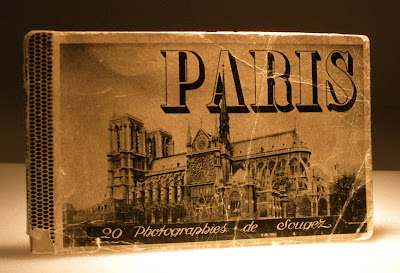Paris: From My Grandmother's Desk
 Allow me to tell you about the mysteries of my grandmother’s desk. Indulge me. I am leading somewhere with this one.
Allow me to tell you about the mysteries of my grandmother’s desk. Indulge me. I am leading somewhere with this one.To Paris, in fact.
It all began when I was a child, seven years old maybe. Old enough to read. Young enough to venture where I should not go with no qualms.
On Sundays, after that big midday meal of chicken and gravy and mashed potatoes and green beans that went on interminably, the grownups would move drowsily to the living room, grab their favorite part of the paper and drift into somnolence.
I would delve into the deep drawers of my Grandma Annie’s desk. Oh, the intrigue there! Old letters and postcards and programs from concerts and plays and church events. Holy cards and prayer books and recipes scribbled on the back of envelopes. Old leather bookmarks and bottles of glue with orange rubber tops and photographs of women garbed in high-necked dresses with leg-of-mutton sleeves and men with handlebar moustaches, all of them dark-eyed and dark-haired and looking squarely into the camera with stern faces
Each item fascinated me and gave me a sense of what? Family? Roots? Place?
This was the ephemera of my grandmother’s life, and it acquired a certain mystique for me, while it also shaped my notion of the past.
The desk had a certain smell, too: A flat, old, paper-y smell.
For decades the sherry flat-topped desk with its two pedestals of drawers remained in the living room of Annie’s house, the house her father bought in 1883.
Lamentably, the house was sold four years ago. Happily, it was sold to people who care about old houses and who have brought it into the 21st century.
The desk remains in the possession of my Aunt Pat, who lives now in a modern apartment only a few blocks away.
It still holds secrets, apparently.
 One of them was a tattered book of black-and-white postcards of Paris, which my aunt gave us earlier this year upon our return from that storied city. Most of the cards have been torn from the book; those that remain suggest – from the look of automobiles in the street shots and the clothing of pedestrians – that the book was produced in the 1930s, in the years just before the Nazi Occupation.
One of them was a tattered book of black-and-white postcards of Paris, which my aunt gave us earlier this year upon our return from that storied city. Most of the cards have been torn from the book; those that remain suggest – from the look of automobiles in the street shots and the clothing of pedestrians – that the book was produced in the 1930s, in the years just before the Nazi Occupation.These are bittersweet images then, images of a Paris gone forever, a Paris humbled and brought to her knees, a Paris not yet beautified by Andre Malraux and his exterior cleaning program: The buildings and monuments are soot-blackened with age.
These and other images formed the Paris of my young dreams. Gritty, a little seedy, but still elegant.
Who gave this booklet to Annie or her mother, Memere? Someone who knew what Paris meant to them. Paris, the mother of cities in the far-off motherland.
Neither woman ever traveled to France. Memere was born in Quebec, Annie in Michigan. But Paris drew them all the same.
I wonder about this book of postcards. But I am not overly eager to solve the mystery of its provenance.
I know this: At some time my young hands must have held the book, my eager fingers rifling through its pages.
And it must have touched me and formed my views of Paris. And forged my dreams.


Comments
Bebe :)
BTW, love the ET photo on your blog!
But what a gift for me.
Annie and her mother would have been with you in spirit walking the streets of today's Paris.
I enjoyed reading about your childhood Sunday lunches and the family routine. It reminded me of Sundays at my grandparents place, though I used to go through boxes of buttons and nick nacks in the afternoons.
Fiona.
I loved to rifle through it.
Tanna, I think sometimes the things we discover influence us as much as the ideas...